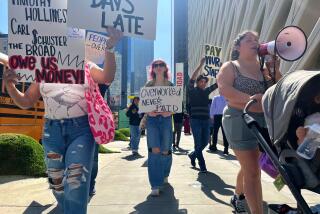Ex-Workers’ Suit Seeks Back Wages
Even as her elderly and anxious mother pleaded with her not to talk to reporters, a Koreatown waitress Tuesday told a news conference how she and other workers were allegedly exploited by a restaurant owner whom they are suing in Los Angeles Superior Court for hundreds of thousands of dollars in back wages.
In an unprecedented action in the local Korean American community, Kyung Sook Kim accused owners of Korean Soup restaurant of paying them illegally low wages and ignoring labor laws because “they thought they could get away with it.”
Kim, 42, who is single and helps support her parents and a disabled brother, said she got two days off every three weeks and was paid $760 a month during most of the nine years she worked for Young Jo Choi and his wife, Bok Seung.
“They treated non-Korean workers better because they were afraid they would sue them,” Kim said. “They thought we would keep quiet because we are Koreans.”
She said the restaurant, which was sold in June, employed five Koreans and three Latinos. All five Koreans are named plaintiffs in the complaint, scheduled for a Superior Court hearing Thursday. They are asking the court to attach the defendants’ assets until the case is tried because of the possibility that they will sell their property and flee the country, said MeeLa Chon, the workers’ lead attorney.
The Chois own two apartment buildings in Koreatown and their Torrance home is up for sale, according to Michelle Yu, co-counsel for the plaintiffs.
Paul Schelly, attorney for the defendants, said his clients are prepared to fight the allegations in court.
He dismissed as “spurious” the argument by the plaintiffs’ lawyers that the defendants might flee the country.
“Why would they hire me to pursue the case, if they are going to run away?” Schelly asked.
On Tuesday, several times during the news conference that was arranged by lawyers for Korean Immigrant Workers Advocates and the Legal Aid Foundation of Los Angeles, Kim’s mother leaped to her feet and admonished her daughter.
“You’re never going to find another job if you say things like this,” she chided. On the verge of tears, the silver-haired woman then turned to journalists and pleaded: “Please don’t take pictures. We don’t want to get into trouble.”
*
Her daughter admitted that she is fearful of being blacklisted by Koreatown employers, but felt compelled to speak up because a bigger issue--the welfare of so many--is at stake.
Koreatown has 283 Korean-owned restaurants, employing 2,000 workers, 70% of them Koreans and 30% non-Koreans, mostly Latinos, according to figures compiled by Korean Immigrant Workers Advocates.
Another former worker, Chong Ok Kang, who worked as a chef for nine years from 1988 until May of this year, said her former employers unilaterally decreased her wage from $2,000 to $1,400 in March, citing slower business brought on by the recent economic downturn in South Korea.
“I had endured 12-hour days without overtime pay for many years,” Kang said. “But for them to decrease my wage by $600 after nine years was too much.”
When Kang complained, she was told, “ ‘If you don’t like it, you can leave whenever you want to,’ ” she said.
All five Korean employees walked out May 20, according to the complaint. Since then, two, including Kang, have found work elsewhere. Two, including Kim, are unemployed, and one is home ill with cancer.
A recent U.S. Labor Department sweep of 33 Koreatown restaurants found violations in all but one, said regional spokesman Tino Serrano. Labor officials are analyzing the data and expect to release their findings later this week.
*
Roy Hong, executive director of Korean Immigrant Workers Advocates, said wage and labor code violations are rampant among Koreatown restaurant owners.
His group’s efforts to work out policies governing restaurant employers and employees have met resistance, he said.
In the predominantly immigrant community, employers and employees suffer from ignorance and unfamiliarity with American labor laws, he said.
“Unless you take a civics course in America, immigrants who come here as adults don’t know rules governing workers and employers,” he said.
More to Read
Sign up for Essential California
The most important California stories and recommendations in your inbox every morning.
You may occasionally receive promotional content from the Los Angeles Times.










